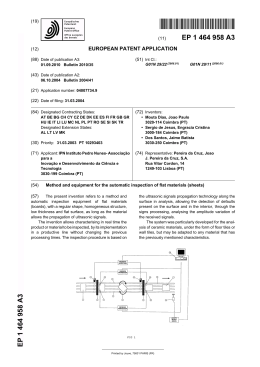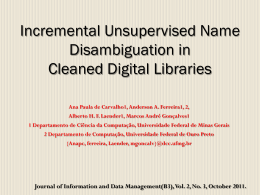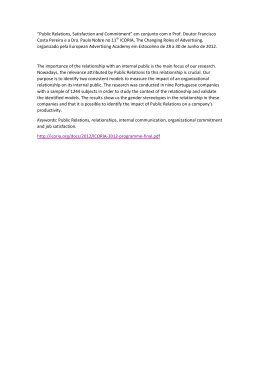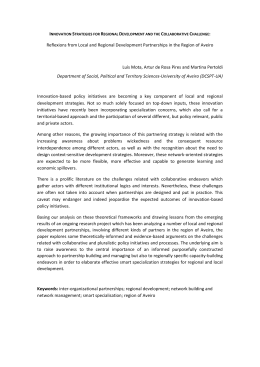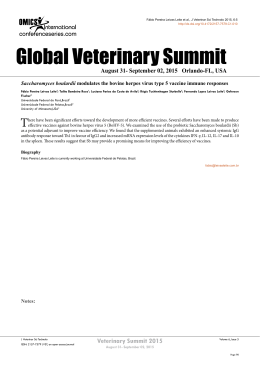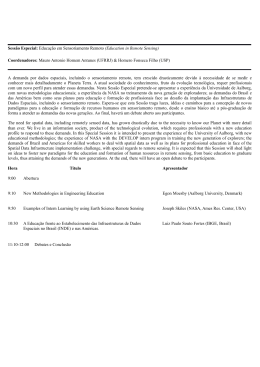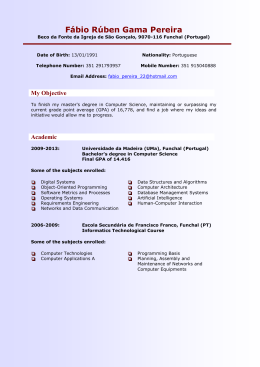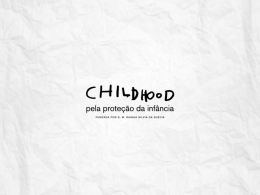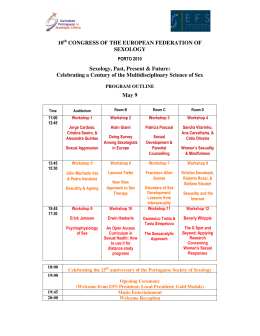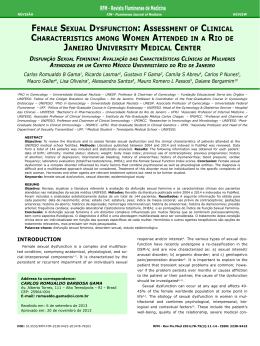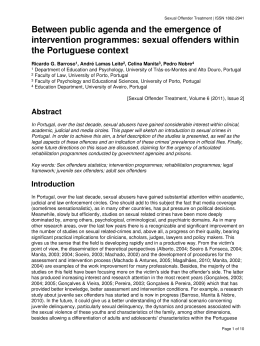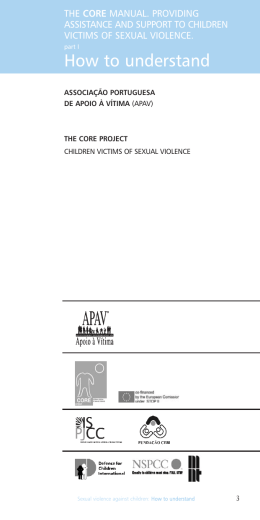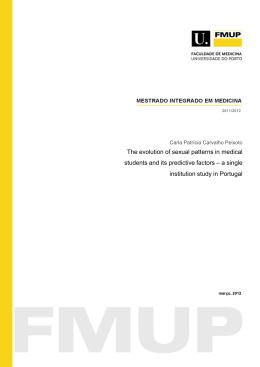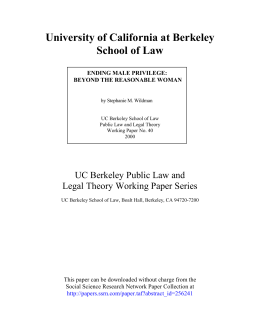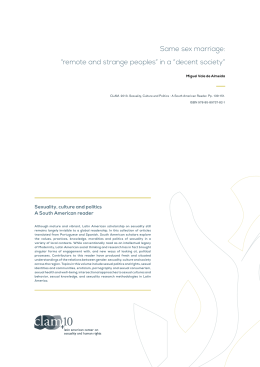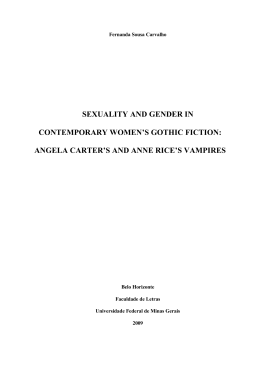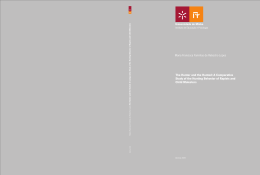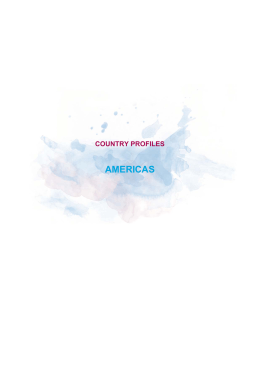Conceptions of Sexuality, Culturality and Gender in Higher Education Graziela Raupp Pereira1 Amanda Rabelo2 Maria Amélia Reis3 António Gomes Alves Ferreira4 Maria do Rosário Pinheiro5 Abstract This paper presents a research project under development in the area of Educational Sciences in Portugal and Brazil, which aims to understand which concepts of gender, sexuality and cultural rights, must be integrated in higher education towards an emancipatory and holistic teaching practice, through data that reveal: which representations of gender, sexuality and cultural changes are there in the training and teaching practices, which influences of teachers’ construction as sexual subjects, influence their teaching practices, which training needs these teachers have concerning these issues, what is the efficiency of a proposal for training in these topics. We also aim to raise the awareness of both countries’ educational systems for the need to invest on training and retraining of teachers, particularly in the area of gender and sexuality education, in order to build a systematic process for reflection and debate on contemporary issues and facts that have become a constant concern of the families and the state. Keywords: Sexuality, Culturality, Gender and Health Education. 1 Post-doctorate student in Education, under contract do the University of Aveiro/Portugal, the University of the State of Santa Catarina and the University of the State of Rio Janeiro/Brasil. E-mail: [email protected] Post-doctorate student in Education, in Coimbra University. E-mail: [email protected] Post-doctorate student in Education, in Coimbra University. E-mail: [email protected] PhD in Educational Sciences by the University of Coimbra. E-mail: [email protected] PhD in Educational Sciences by the University of Coimbra. E-mail: [email protected] 2 3 4 5 1 Introduction The gender equality, the sexual and reproductive health, the right of access to contraception, the promotion of a responsible and aware motherhood and fatherhood, the spread of family planning and the assurance of a non-discrimination based on sexual orientation, are today essential so as to provide an answer to the society's concerns regarding the limited improvements in the area of public policies and investments in recent years. These changes are needed to promote an effective solution to face these issues, and to focus on training as a way of students having an intentional sex education. Studies show that prejudice against homosexuals is lower in individuals who have a higher level of education. Thus, a investigation about Brazilian Youth present that: "The percentage of young people th who had completed the 4 grade of elementary school and do not want gays as neighbours is 68.3% against 19.1% of those with higher education. Similarly, only 18.8% of the less educated are neutral, far less the indifference of 50.1% of respondents with higher education "(CARA & GAUTO, 2007, p. 193). Suggestions for the improvement of education and health care contained in the United Nations Millennium Declaration (2000), supported at the Cairo Conference (1994) about population and sustainable development, and reaffirmed in the Declaration of Yogyakarta (2006) about the Human Rights in relation to Sexual Orientation and Gender Identity, have emphasized the importance of the issue surrounding this work by focussing on the following priorities of research and action: (i) gender and sexuality and their plural ways of being, (ii) the culturality , as an act of intentional ethnoknowledge and “ethnorecognition” (Reis, 2007) and as a way of understanding culture(s) as a movement and dynamic process of symbolic interaction of individuals (Pretceille-Abdallah, 2001) and (ii) teaching practices and teachers’ training as a means of overcoming the silence in the school curriculum and its cultural ramifications, and (iv) Promotion and Education for Sexual Health towards a holistic and emancipatory education (Reis, 2002). Sex education also emerges as one of the most worrying concerns, which is almost always intentionally neglected by the teacher. However, more and more educational institutions have been convened to address the transformations of contemporary sexual practices, since its effects are evident in the school routine. In order to reverse this situation, education institutions have been daily confronted with an attempt to make the issue of an intentional sex education, as well as sexuality, cultural and gender issues into something discussed, talked with ease, so that the human being can better relate with himself and with others (Pereira, 2008; Crawford, 2008; Almeida, Silva and Cunha, 2005; CCPES, 2000). It is essential to understand the issues of gender, sexual and cultural concepts to reinterpret logs from a historical genesis in dominating myths, beliefs and taboos inherent to the historical process of learning and understanding the world and life. The challenges to our working group come up with assumptions that are needed here and that impose to be extended in order to provide more scientific 2 support to the issue under analysis. Thus, we refer to previous work done by the group that will be reaffirmed in connection to this project. If the educational practice is here understood considering its present socio-historical-materialist side as "human practice", by the concept “practice” is not meant the social "entity" detached from the theories it designed, it includes sex education. Our research refers to a practice always under construction by combining the speeches narrated and impossibilities to envision it as detached from their cultural origins and its plural contemporaneous sides. Under these epistemological aspects is part of the work of Reis (2002, 2007a and b), Rabelo (2009), Pereira (2007a, 2007b), Pinheiro (2008), asking what processes and experiences influence sexual individuals in construction and how they have impact on their teaching practices, underlining the importance of training in sex education as one of the ways through which we can build a new narrative for the teacher training, deconstructing old behaviours. The results of our previous research suggests the need for greater depth towards this analysis and motivates us to go expand the range of our actions to further innovations in the fields of training and sex education, such as: (a) the construction of a training model that is able to overcome the functionalist and universalist thinking who perceive sexuality and health as neutral and ethnocentric and thus detached from its social, ethnocentric and cultural plurality, (b) to investigate the field of research and intervention-action, and the researchers themselves, so as to understand their difficulties when teaching this issue and the way they overcame them, (c) to promote an understanding of the investigation about the concepts that shape their representations and how these affect their teaching, so that they can define the conditions for better understanding themselves and others. In relation to the size of our research, there is a suggestion which includes two studies and aim to understand the conceptions of gender, sexuality and cultural identity, which must perceive teacher training towards a holistic and emancipatory teaching practice in these themes. The first relates to a survey of conceptions and representations of sexuality, gender, culturally, sex education and training needs felt by teachers and future teachers in these areas. The second study focuses on training evaluation, through a before and after training process, followed by a follow-up evaluation, reflecting upon the monitoring of the impact of training on the transformation of conceptions of sexual, cultural and sexual health promotion and reproductive health in order to improve teaching quality. Relying mainly on qualitative methodologies, it is through instruments such as interviews and focus groups, that we will collect the stories and memories of teachers and future teachers in training. Thus, we will focus on the quality of the assessment tools for the collection of qualitative and also quantitative data (Hill & Hill, 2008) so that we can triangulate the information and relate the variables to gain an understanding of the phenomena under study. With this suggestion, taking into account the political and pedagogical reasons cited above, we make a correlational and longitudinal study on teacher education and its impact on educational practice and curriculum development, comparing the Brazilian and Portuguese realities. It is noteworthy that the great challenge of this research is: (a) to investigate teacher training for sex education can become effective in the school curriculum as a form of right to life, (b) to propose a 3 training model that is linked to sexuality and culturality (c) to focus on a less studied group concerning the sexual-cultural relationship, as they are the future teachers of different areas. The methodology to be implemented in this research is grounded on the basic assumption of the investigation-action, and longitudinal correlation. In each country we select two public universities that have agreed to participate in the study. However, we do not want to do an exhaustive survey of the subject involved, but to develop a research providing us information to characterize the teaching of initial teacher training in sex education in greater depth than in extent. We chose a comparative study between Brazil and Portugal considering the differences in the social, historical and cultural context. Our sample consists of student teachers (university students in teacher training) attending courses for the Degree of Education, with an intentional sample of 400 individuals in each country, making a total of 800 individuals. The choice of this target audience is an innovative aspect, because there is a gap noted by several authors (Reis, 2007; Azevedo, 2005, Melo et al. 2006; Pereira & Pereira 2008a, Pereira 2007a) in the initial and future training, because they lack the curricular proposals to fill in the issues of gender and sexuality, perceiving culturality. As we have already done in previous studies, we propose an action research with teachers and students of teacher training courses for Higher Education, in order to move forward in the discussion of the contents of the investigated area, beyond history biologism that ignores the elements connected to the emotions, the feelings, the different sexual orientations, and the several ethnic and cultural differences. References ABDALLAH-PRETCEILLE. Education et Communication Interculturelle. 2e éd. Paris: PUF, 2001. BRASIL. Secretaria de Educação Fundamental. Parâmetros curriculares nacionais: pluralidade cultural, orientação sexual/ Secretaria de Educação Fundamental, Brasília: MEC/SEF, 1997. HILL, M.; HILL, A. Investigação por Questionário, Lisboa: EdIções Silabo, 2008. MELO, S. M. M. Et al.. Uma contribuição à formação de educadores: a inserção curricular da disciplina educação e sexualidade no curso de pedagogia, modalidade à distância, no CEAD/UDESC, 2006. PEREIRA, G. R.; et al. O Currículo em Educação Sexual de Portugal e do Brasil: algumas reflexões sobre as orientações. In VIII Colóquio sobre Questões Curriculares - IV Colóquio Luso-Brasileiro sobre Questões Curriculares, Florianópolis, Santa Catarina, Brasil (in press). 2008. PEREIRA, G. R.; PEREIRA, A. HIV/AIDS Teaching and Learning Necessities. In: Muñoz, M.; Jelinek, I.; Ferreira, F. (orgs.). Proceedings of the IASK International Conference: International Association for the Scienfic Knowledge. Aveiro, 2008, p.608-613. PEREIRA, G. R. Desenvolvimento de um Programa de Intervenção Psicopedagógico de Suporte à Criança Infectada pelo VIH. 286p. Tese deDoutorado em Ciências da Educação, Universidade de Aveiro, Aveiro, 2007. PINHEIRO, M.R. (, Abril). Sexualidade e Educação: O que é que uma coisa tem a ver com a outra?. Comunicação apresentada no II Encontro SOS Estudante - Em linha com a sexualidade. Coimbra: Instituto Superior da Juventude, 2008. 4 PROJECTO DE LEI Nº 660/X/2009. Diário da República 5 | II Série A - Número: 071 | 19 de Fevereiro, Portugal. Disponível em http://app.parlamento.pt. Acesso em: 16 de abril de 2009. RABELO, A. A figura masculina na docência do ensino primário: Um “corpo estranho” no quotidiano das escolas públicas “primárias” do Rio de Janeiro-Brasil e Aveiro-Portugal. Tese de Doutorado em Ciências da Educação, Universidade de Aveiro, Aveiro, 2009. REIS, M. A. (Re)invenção da Escola Pública: sexualidade e Formação da Jovem Professora. Tese de Doutorado em Educação. Universidade Federal Fluminense, Brasil, 2002. REIS, M. A. Ethnic-Knowledge towards an Ethinic-Acknowledgement the importance of differentiated Education to the construction. Athens Institute for Education and Research. Athens, 2007a. REIS, M. A. Nexus & Sexus in the formation of the future young educator: a comparative study it points questions to debate. Athens Institute for Education and Research. Athens, 2007b. 5
Download
